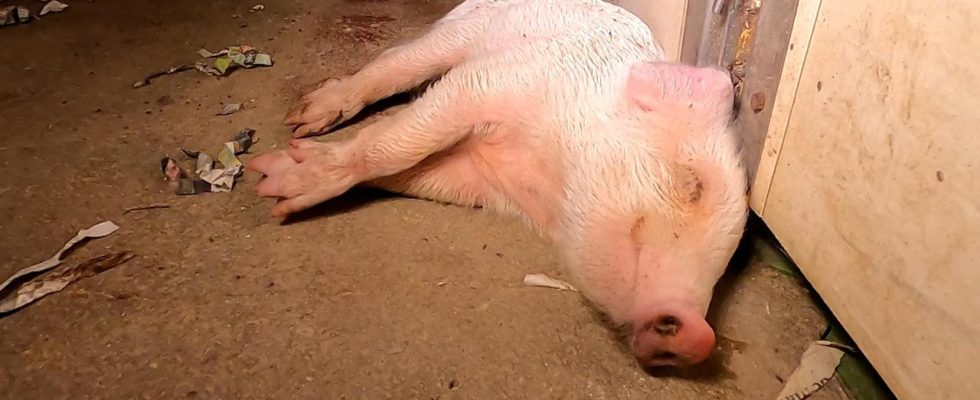exclusive
Dead pigs, mountains of bones and skulls – pictures from a Spanish breeding farm show massive animal cruelty and represent factory farming in the country. Meat from the company probably also reached Germany ARD-Show research.
Animal rights activists have been monitoring the stables of a pig farmer south of Burgos for months. The resulting images show rats and maggots in the stables, dead pigs that are eaten by other pigs or dying animals that are later eaten by vultures outside the halls.
Several thousand animals are kept here. The area is surrounded by a fence and a tractor is parked under a pine tree. There are dead animals in the shovel. Countless bones and skulls in an adjacent forest show that dead animals are regularly dumped there. A great source of food for the vultures that live in large numbers in this region.
Meat also delivered to Germany
The former Spanish Minister for Consumer Protection, Alberto Garzón, probably had companies like this in mind when he said two years ago that pork from Spain was often inferior and came from mistreated animals.
Garzón wanted to question a booming business. While the number of pigs in Germany has decreased by a good 25 percent in recent years, the number in Spain has risen sharply – by 35 percent within ten years, according to the European statistics agency Eurostat. According to Spanish figures, more than 50 million pigs are currently being fattened and slaughtered in the country. The environmental organization Greenpeace speaks of industrial meat production that has “spread uncontrollably” in Spain.
Germany recently imported more than 50,000 tons of pork from Spain. Documents that ARD Studio Madrid and leaked to the newspaper “El Pais” show that the company described was proven to have delivered meat to the manufacturer Campofrio until 2022, whose sausage is also sold in German supermarkets.
Owner comments contradictory
Large grocery chains now admit this when asked, but say that Campofrio is currently no longer supplied by the company near Burgos. The meat manufacturer also confirms this. The owner, on the other hand, makes contradictory comments about any further deliveries.
For Greenpeace Spain, the error lies in the system. Meat manufacturers want to produce as quickly and as cheaply as possible. This inevitably has an impact on the quality of the food. Because animals are crammed so closely together, manufacturers need large quantities of medication. “Spain is the country in Europe where most drugs are used in livestock farming. And that is precisely due to this industrial model,” says Greenpeace spokesman Luis Ferreirim.
Animal rights activists file a complaint
On Monday, the animal welfare organization Animal Welfare Observatory reported the pig farm. It’s about animal cruelty and consumer fraud, among other things. They should have assumed that they were getting meat from well-cared for, healthy animals. Especially since the company was allowed to have an animal welfare certificate – awarded by a private initiative.
Animal and environmental activists think little of these awards. They are often created by the meat industry itself and are awarded according to criteria it has set itself. “This is of course completely unacceptable and serves to confuse the public,” said Ferreirim.
90 percent Factory farming
The meat lobby is powerful in Spain. Two years ago, after his minister’s criticism of industrial meat production in Spain, Prime Minister Pedro Sanchez felt compelled to publicly rave about a “perfectly cooked steak.”
More than 90 percent of the pork produced in Spain comes from industrial factory farming. Environmentalist Tom Kucharz from Ecologistas en Acción says: “And these are products that also come to supermarkets in Germany.” Animal cruelty in Spain is also linked to the consumption of German consumers.
Silke Diettrich, ARD Madrid, tagesschau, November 30, 2023 10:00 a.m


